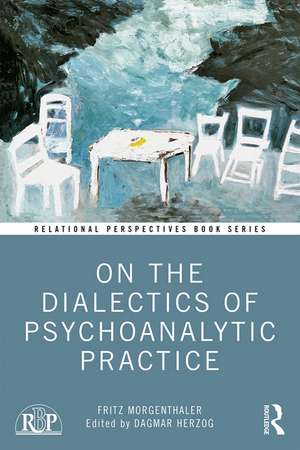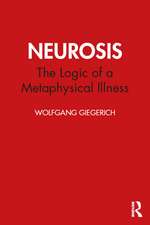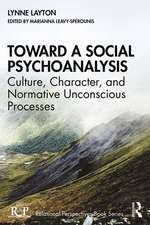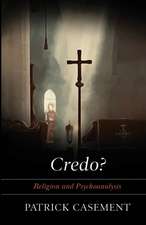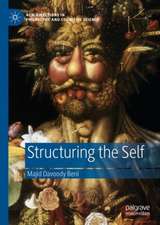On the Dialectics of Psychoanalytic Practice: Relational Perspectives Book Series
Autor Fritz Morgenthaler Editat de Dagmar Herzogen Limba Engleză Paperback – 3 apr 2020
Fritz Morgenthaler was a crucial figure in the return of psychoanalysis to post-Nazi Central Europe. An inspiring clinician and teacher to the New Left generation of 1968, he was the first European psychoanalyst since Freud to declare that homosexuality is not, indeed never, a pathology, and in Technik, developed revolutionary ideas for transforming clinical technique. On the Dialectics of Psychoanalytic Practice offers the first publication in English of this psychoanalytic, counterculture classic.
Those who first picked up Technik encountered it at a historical moment when Marxist psychoanalyst Wilhelm Reich, popular New Left cultural critic Klaus Theweleit, and the texts of the Frankfurt School were already required reading. While not a political text in the same direct way, Morgenthaler's Technik nonetheless shared many of their preoccupations and conclusions about human nature. It was read as technical guidance for psychoanalysts, but also as a manifesto dedicated to the problem of how it might be possible genuinely to live a postfascist, and nonfascist, existence. Morgenthaler was a proto-relationalist, who recombined the traditions of ego and self-psychology as he retained a commitment to drive theory. Here Dagmar Herzog makes his work available to a new generation of analysts, providing essential source material, annotations, and groundbreaking analysis of the continued importance of the work for historians and therapeutic practitioners alike.
On the Dialectics of Psychoanalytic Practice will interest practicing clinicians as well as intellectual historians and cultural studies scholars seeking to understand the return of psychoanalysis to post-Nazi Central Europe.
| Toate formatele și edițiile | Preț | Express |
|---|---|---|
| Paperback (1) | 332.89 lei 6-8 săpt. | |
| Taylor & Francis – 3 apr 2020 | 332.89 lei 6-8 săpt. | |
| Hardback (1) | 1095.75 lei 6-8 săpt. | |
| Taylor & Francis – 31 mar 2020 | 1095.75 lei 6-8 săpt. |
Din seria Relational Perspectives Book Series
- 5%
 Preț: 288.35 lei
Preț: 288.35 lei - 5%
 Preț: 227.31 lei
Preț: 227.31 lei - 5%
 Preț: 250.72 lei
Preț: 250.72 lei - 5%
 Preț: 316.59 lei
Preț: 316.59 lei - 5%
 Preț: 309.04 lei
Preț: 309.04 lei -
 Preț: 266.64 lei
Preț: 266.64 lei -
 Preț: 229.70 lei
Preț: 229.70 lei - 5%
 Preț: 231.82 lei
Preț: 231.82 lei - 5%
 Preț: 267.45 lei
Preț: 267.45 lei - 5%
 Preț: 301.83 lei
Preț: 301.83 lei - 5%
 Preț: 273.22 lei
Preț: 273.22 lei - 5%
 Preț: 331.64 lei
Preț: 331.64 lei - 5%
 Preț: 189.76 lei
Preț: 189.76 lei -
 Preț: 275.32 lei
Preț: 275.32 lei - 5%
 Preț: 289.38 lei
Preț: 289.38 lei - 5%
 Preț: 231.82 lei
Preț: 231.82 lei - 5%
 Preț: 940.24 lei
Preț: 940.24 lei - 5%
 Preț: 232.76 lei
Preț: 232.76 lei - 5%
 Preț: 275.61 lei
Preț: 275.61 lei -
 Preț: 213.39 lei
Preț: 213.39 lei - 5%
 Preț: 274.21 lei
Preț: 274.21 lei - 5%
 Preț: 233.26 lei
Preț: 233.26 lei - 5%
 Preț: 315.50 lei
Preț: 315.50 lei - 5%
 Preț: 287.14 lei
Preț: 287.14 lei - 5%
 Preț: 220.58 lei
Preț: 220.58 lei -
 Preț: 373.33 lei
Preț: 373.33 lei - 5%
 Preț: 253.45 lei
Preț: 253.45 lei - 5%
 Preț: 183.34 lei
Preț: 183.34 lei - 5%
 Preț: 318.22 lei
Preț: 318.22 lei - 5%
 Preț: 266.90 lei
Preț: 266.90 lei - 5%
 Preț: 274.81 lei
Preț: 274.81 lei - 5%
 Preț: 346.04 lei
Preț: 346.04 lei - 5%
 Preț: 219.50 lei
Preț: 219.50 lei - 5%
 Preț: 231.90 lei
Preț: 231.90 lei - 5%
 Preț: 324.11 lei
Preț: 324.11 lei - 5%
 Preț: 380.39 lei
Preț: 380.39 lei - 5%
 Preț: 332.27 lei
Preț: 332.27 lei - 5%
 Preț: 534.99 lei
Preț: 534.99 lei - 5%
 Preț: 323.31 lei
Preț: 323.31 lei -
 Preț: 336.72 lei
Preț: 336.72 lei - 5%
 Preț: 416.67 lei
Preț: 416.67 lei - 5%
 Preț: 425.09 lei
Preț: 425.09 lei - 5%
 Preț: 456.44 lei
Preț: 456.44 lei - 5%
 Preț: 464.96 lei
Preț: 464.96 lei - 5%
 Preț: 382.83 lei
Preț: 382.83 lei
Preț: 332.89 lei
Preț vechi: 350.42 lei
-5% Nou
63.70€ • 66.68$ • 52.71£
Carte tipărită la comandă
Livrare economică 05-19 aprilie
Specificații
ISBN-10: 0367337681
Pagini: 210
Ilustrații: 3 Illustrations, black and white
Dimensiuni: 156 x 234 x 11 mm
Greutate: 0.32 kg
Ediția:1
Editura: Taylor & Francis
Colecția Routledge
Seria Relational Perspectives Book Series
Locul publicării:Oxford, United Kingdom
Public țintă
Postgraduate, Professional, and Professional Practice & DevelopmentCuprins
Notă biografică
Dagmar Herzog is Distinguished Professor of History at the Graduate Center, City University of New York. She is the author, most recently, of Cold War Freud: Psychoanalysis in an Age of Catastrophes (2017) and Unlearning Eugenics: Sexuality, Reproduction, and Disability in Post-Nazi Europe (2018).
Recenzii
– MATT FFYTCHE, Department of Psychosocial and Psychoanalytic Studies, University of Essex
"The psychoanalytic contributions of Fritz Morgenthaler, widely admired and idealized in Europe, are mostly unknown in the US. Notably, he was a pioneering contributor to rethinking psychoanalysis’ pathologization of same-sex feelings, behaviors and relationships. This new edited translation of Morgenthaler’s lectures on psychoanalytic technique is compelling and accessible. Technik should prove a valuable read to historians, students and seasoned practitioners of psychoanalysis."
– JACK DRESCHER, MD, Clinical Professor of Psychiatry, Columbia University
"Fritz Morgenthaler’s Technik is a call for the continued relevance of psychoanalysis to understand not only the self, but also broader social and political phenomena. These lectures and supplemental texts will be essential to anyone interested in the potential of psychoanalysis to offer a systematic critique of social normativity (especially in the domain of sexuality)."
– CAMILLE ROBCIS, author of The Law of Kinship: Anthropology, Psychoanalysis, and the Law in France
Descriere
Fritz Morgenthaler was a crucial figure in the return of psychoanalysis to post-Nazi Central Europe. An inspiring clinician and teacher to the New Left generation of 1968, he was the first European psychoanalyst since Freud to declare that homosexuality is not, indeed never, a pathology, and in Technik, developed revolutionary ideas for transforming clinical technique. On the Dialectics of Psychoanalytic Practice offers the first publication in English of this psychoanalytic, counterculture classic.
Those who first picked up Technik encountered it at a historical moment when Marxist psychoanalyst Wilhelm Reich, popular New Left cultural critic Klaus Theweleit, and the texts of the Frankfurt School were already required reading. While not a political text in the same direct way, Morgenthaler's Technik nonetheless shared many of their preoccupations and conclusions about human nature. It was read as technical guidance for psychoanalysts, but also as a manifesto dedicated to the problem of how it might be possible genuinely to live a postfascist, and nonfascist, existence. Morgenthaler was a proto-relationalist, who recombined the traditions of ego and self-psychology as he retained a commitment to drive theory. Here Dagmar Herzog makes his work available to a new generation of analysts, providing essential source material, annotations, and groundbreaking analysis of the continued importance of the work for historians and therapeutic practitioners alike.
On the Dialectics of Psychoanalytic Practice will interest practicing clinicians as well as intellectual historians and cultural studies scholars seeking to understand the return of psychoanalysis to post-Nazi Central Europe.
